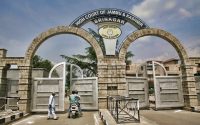$100 Website Offer
Get your personal website + domain for just $100.
Limited Time Offer!
Claim Your Website NowGovt can frame laws on hiring of teachers in nation’s interest.
Source – hindustantimes.com
The Supreme Court on Monday held that the government can in national interest frame laws to regulate appointments of teachers to educational institutions regardless of whether they are run by majority or minority communities provided the intent is to ensure the standard of excellence.
A bench of justices Arun Mishra and U U Lalit gave the ruling while upholding the validity of the West Bengal Madrasah Service Commission Act, 2008. The law regulates the process of appointments of teachers to aided Madrasas recognised as minority institutions through a commission created by state government.
The bench set aside the judgment of the Calcutta high court, which struck down the commission created under the Act as unconstitutional in 2014.
“When it comes to the right to appoint teachers, in terms of the law laid down in TMA Pai Foundation, a regulation framed in the national interest must necessarily apply to all institutions regardless whether they are run by majority or minority as the essence of Article 30 (1) is to ensure equal treatment between the majority and minority institutions,” the court ruled. “.. if merit is not the sole and governing criteria, the minority institutions may lag behind the non-minority institutions rather than keep in step with them.”
The Contai Rahamania High Madrasa had filed a petition in the Calcutta HC challenging provisions of the Act under which the commission comprising a chairperson and four other members were empowered to make binding recommendations regarding the appointments.
It was submitted that the Act transgressed upon the rights of minority institutions in choosing their own teachers. A single-judge of the HC accepted the argument and allowed the plea. Some candidates, whose names were recommended by the commission to be appointed as teachers in aided Madrasas, filed an appeal before the division bench of the HC, which affirmed the judgment of the single judge and dismissed their appeal in 2015.
The Supreme Court relied on its 11-judge bench judgment in the TMA Pai Foundation case and held that the right of minorities to establish and administer educational institutions under Article 30 of the Constitution is not absolute or above the law. It added conditions concerning the welfare of students and teachers must apply provided they do not interfere with right of administration of a minority institution.
The court noted that when framing a law, which interferes with minority institutions, a balance has to be kept between two objectives of ensuring the standard of excellence of an institution and the preservation of the right of the minorities to establish and administer their educational institutions.
The SC noted that the composition of the West Bengal commission empowered to make appointments to madrasas was such that it would ensure compatibility of the teachers, who would be selected to impart education.
“Apart from the Chairman, there are four members who are to be appointed in terms of Section 4(iii) of the Commission Act. One has to be an eminent educationist, while the other two Members must have teaching experience inter alia as a teacher of a University, or a Principal of a College for a period of not less than ten years…,” the SC said.
“In my view, this should not impact the overall right to make appointments of good teachers by other minority institutions through their committee of management by exercising their rights under Articles 29 and 30 of the Constitution of India,” said advocate MR Shamshad, who appeared for teachers appointed by the commission.



